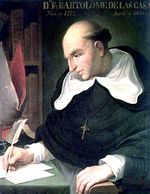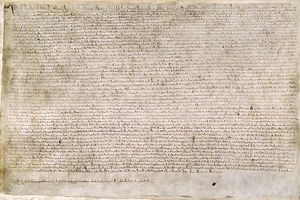The origins of fundamental rights
| Professeur(s) | Victor Monnier[1][2][3][4][5][6] |
|---|---|
| Cours | Introduction to law |
Lectures
- The definition of law
- The State
- The different branches of law
- The sources of law
- The great formative traditions of law
- The elements of the legal relationship
- The application of law
- The implementation of a law
- The evolution of Switzerland from its origins to the 20th century
- Switzerland's domestic legal framework
- Switzerland's state structure, political system and neutrality
- The evolution of international relations from the end of the 19th century to the middle of the 20th century
- The universal organizations
- European organisations and their relations with Switzerland
- Categories and generations of fundamental rights
- The origins of fundamental rights
- Declarations of rights at the end of the 18th century
- Towards the construction of a universal conception of fundamental rights in the 20th century
Religious origins
In antiquity, the individual did not enjoy any area of autonomy that was forbidden to the action of power. The individual has no right to psychological or physical integrity. In Sparta celibacy is forbidden, in Rome it is forbidden to drink pure wine, in Athens women cannot leave the city with more than three dresses.
Freedom is therefore only the participation of the human being in the management of the State. At that time, there was no recognized sphere of freedom. However, the emergence of Christianity will bring about a real intellectual revolution.
Three key lessons can be drawn:
- every man is created in the image of God;
- his tour is immortal;
- the soul of man is therefore immortal.
According to Christ's message, man is not made to live on this earth, but to pass through it, having as his vocation to eternal life. From this observation, the dignity of man is established.
The second proposal that emerges from Christ's message is that all men are children of God. All men are therefore equal: they enjoy an equal share of God's love (principle of equality).
Each man, in order to fulfill his own destiny, enjoys a sphere of individual autonomy. All these structures are only means at the service of man in order to help him in his spiritual vocation. The State must then respect the sphere of individual human autonomy.
The consequence of the Christian message is that the first doctrinal elaboration of Human Rights in the West belongs to Spanish Catholic legal theologians. It is in the midst of a debate between the supporters of the Spanish conquest of America in the 16th century who advocated the enslavement of the Indians and those who defended the freedom of the Indians.
The affirmation of this first doctrinal elaboration is from Vittoria (1492 - 1546) and Bartholomé Las Casas (1474 - 1566). The Indians are recognized as having real power in both the private and public spheres and the Spanish conquistadors cannot prevent them. This statement is tantamount to recognizing the equal rights of Indians. Thus, the trigger for human rights was in Spain in the 16th century.
« Our religion is one, and can suit all the nations of the world; it receives them all in its bosom, and does not take away any of its freedom or its masters; it is especially far from wanting to make peoples slaves on the pretext that they were born for that, as the Lord Bishop claims. May Your Majesty therefore deign, at the beginning of his reign, to show great contempt for this evil doctrine, and to disavow its consequences »
— Las Casas
It shows that Indians are creatures of God and cannot be slaves. He will join Vittoria's theses:
« Among the Unbelievers, who live in these distant kingdoms, who have never heard of Christ, who have not received faith, there are true Lords, Kings and Princes. Natural law and people's law grant them sovereignty, dignity and royal pre-eminence... The same applies to the domination of individuals over lower assets »
— Las Casas[7]
The defence of these theses shows that the first doctrinal approach was taken at the beginning of the 16th century, showing that all human beings are equal in that they are all creatures of God.
Political origins
Many political events have played a role in the political origins of fundamental rights.
In 13th century England, there was a conflict between the King and his vassals. At the end of this conflict, the Magna Carta of June 12, 1215 was enacted. It is an authentic text signed by the vassals and the king. It clearly defines the rights and duties and guarantees a number of privileges to its vassals. And these rights and privileges can be a reminder in a way of our personal freedoms.
« No free man shall be arrested or imprisoned, or dispossessed of his property, or declared outlawed, or exiled, or executed in any way, and we shall not act against him or send anyone against him, without a legal judgment from his peers and in accordance with the law of the land. »
— Article XXXIX.
« All merchants may, freely and safely, leave England, and come to England, remain there, and travel to England by road and ship, to buy and sell, without any irregular tolls, in accordance with ancient and just customs, except in time of war and if these merchants are from a country at war with us. If there are such merchants in our country at the beginning of a war, they will be detained, without any damage to their persons or property, until we, or our Great Justice, are informed of how our merchants are treated in the country at war with us, and if ours are saved, the others will be saved in our country. »
— Article XLI.
The many conflicts between the King and his parliament have led to numerous texts guaranteeing fundamental rights, including many treaties.
Philosophical origins
Among the many philosophers who have had an influence on natural human rights, we will discuss John Locke and the debate on civil government (1632 - 1704). His political thinking is determined by the idea that legitimate government, that is, government in conformity with the aspirations of the governed, is the product of the voluntary consent of free and equal individuals.
For John Locke and the debate on civil government, men decided to put an end to the state of nature by agreeing to establish a political society: it is the social contract that forms the basis of political society. This political society established by the social contract from which legitimate government emanates from free and equal individuals aims to guarantee natural human rights. They were previously neither protected nor guaranteed; this need for protection pushes people out of the state of nature and into the political society they constitute, resulting in the guarantee of fundamental and natural human rights.
The theory of the social contract will have a great influence, particularly in the first Declarations of Human Rights. From these religious, political, philosophical origins emanate ideas and principles of freedom and equality of individuals.
Annexes
- Magna Carta
- Le discours et l'événement. L'émergence des droits de l'homme et le christianisme dans l'histoire occidentale - Alfred Dufour
- Université de Genève. “Introduction Aux Droits De L'Homme.” Coursera, https://www.coursera.org/learn/droits-de-lhomme.
References
- ↑ Publication de Victor Monnier repertoriées sur le site de l'Université de Genève
- ↑ Hommage à Victor Monnier sur le site de l'Université de Genève
- ↑ Publications de Victor Monnier sur Cairn.info
- ↑ Publications de Victor Monnier sur Openedition.org
- ↑ Page personnelle de Victor Monnier sur le site de l'Université de Aix-Marseille
- ↑ En Hommage À Victor Monnier.” Hommages.ch, 11 Mar. 2019, www.hommages.ch/Defunt/119766/Victor_MONNIER.
- ↑ Cf. B. DE LAS CASAS, Aquí se contienen treinta proposiciones muy jurídicas... in A. M. FABIE, Vida y escritos de Fray B. de Las Casas, Madrid


